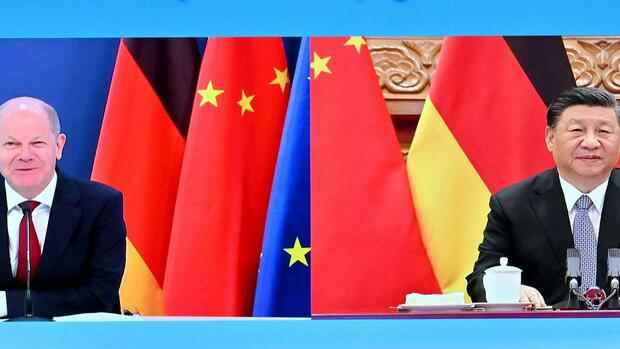It’s Halloween, the time when little ghosts and witches haunt the streets. So maybe it’s also due to the season that a malicious Germany metaphor is up to mischief in Brussels right now. The Federal Republic, it says, is not an ordinary country, but “an industrial association that masquerades as a state”.
Sure, that’s just a joke at first, but one in which the growing impatience with German politics resonates and conveys an mood that one shouldn’t simply ignore in Berlin.
Germany has long been suspected of putting the short-term profit striving of its large corporations ahead of long-term strategic calculations. The debacle of the pipeline partnership with Russia, which Berlin pushed ahead against fierce resistance from Eastern Europe, shows where this is leading: into a network of dependencies that makes Europe’s most important economic nation vulnerable to blackmail and weakens the EU as a whole.
Is Germany ready to learn lessons from the failed Russia policy?
If the “turning point” with which Chancellor Olaf Scholz wants to correct the mistakes of the past kept what it promises, the critics would probably have fallen silent long ago. To this day, no one in Brussels can say exactly where the turning point will lead. The protagonists in the Chancellery probably don’t really know themselves.
Top jobs of the day
Find the best jobs now and
be notified by email.
The EU institutions have therefore been discussing Germany’s China policy for days, shaking their heads. According to the assessment of top officials in Brussels, dealings with the People’s Republic will show whether Berlin is willing to learn lessons from the failure of German Russia policy.
>> Read here: The Scholz dilemma – resistance to the Chancellor’s China strategy is growing
The signals recently sent by the chancellor do not exactly make our European partners confident. Scholz seems to be picking up where his predecessor Angela Merkel left off. On Friday he flies to Beijing and pays tribute to head of state Xi Jinping, who just got rid of his last moderate opponents at the Communist Party Congress. In tow of the traveling salesman from Berlin: a select group of company representatives. Like in the old days.
Every week, Moritz Koch, head of the Handelsblatt office in Brussels, analyzes trends and conflicts, regulatory projects and strategic concepts from the inner workings of the EU, alternating with other Brussels correspondents. Because anyone interested in business needs to know what’s going on in Brussels. You can reach him at: [email protected]
The German government’s approval of the Chinese participation in a Hamburg port terminal and the sale of the chip manufacturer Elmos to a Chinese investor complete the picture of the German unwillingness to learn.
Scholz has to do what is least important to him: explain himself and his politics. There are good arguments for the German government not to intervene in both the port and Elmos deals. What is missing is embedding in a clear strategy.
A new China policy does not have to be a complete break with the old one
The big picture is decisive for the acceptance of German politics in Brussels. Should the primacy of corporate interests also apply in his chancellorship, “Merkel as usual”, as European politician Reinhard Bütikofer scoffs? Or is Scholz ready to push through a course adjustment if necessary, even against the resistance of companies like VW and BASF, which are closely tied to the Chinese market?
The Federation of German Industries, which, unlike some DAX companies, affords the luxury of thinking beyond the next quarter, describes the task for the federal government in a new analysis: “In the current geopolitical crises, risk prevention is the order of the day.” A new China policy does not have to be a complete break with the old one. The goal is neither deglobalization nor comprehensive decoupling, but less blackmailing.
Europe urgently needs to reduce the dependencies that currently exist for critical raw materials (see rare earths) and mobile communications (see 5G network components). A turning point in Germany that delivers what it promises means anticipating possible conflicts and preparing the EU for them – and not just working through the Bundeswehr’s wish list with a special fund.
More: Was it right to approve the China engagement in the port of Hamburg?
